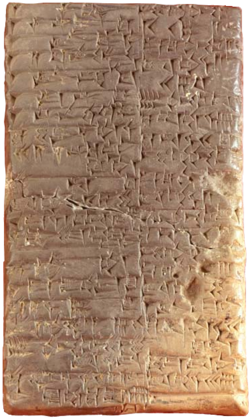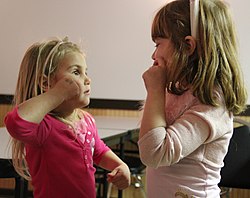Portal:Language
Introduction




Language is a structured system of communication that consists of grammar and vocabulary. It is the primary means by which humans convey meaning, both in spoken and signed forms, and may also be conveyed through writing. Human language is characterized by its cultural and historical diversity, with significant variations observed between cultures and across time. Human languages possess the properties of productivity and displacement, which enable the creation of an infinite number of sentences, and the ability to refer to objects, events, and ideas that are not immediately present in the discourse. The use of human language relies on social convention and is acquired through learning.
Estimates of the number of human languages in the world vary between 5,000 and 7,000. Precise estimates depend on an arbitrary distinction (dichotomy) established between languages and dialects. Natural languages are spoken, signed, or both; however, any language can be encoded into secondary media using auditory, visual, or tactile stimuli – for example, writing, whistling, signing, or braille. In other words, human language is modality-independent, but written or signed language is the way to inscribe or encode the natural human speech or gestures.
Depending on philosophical perspectives regarding the definition of language and meaning, when used as a general concept, "language" may refer to the cognitive ability to learn and use systems of complex communication, or to describe the set of rules that makes up these systems, or the set of utterances that can be produced from those rules. All languages rely on the process of semiosis to relate signs to particular meanings. Oral, manual and tactile languages contain a phonological system that governs how symbols are used to form sequences known as words or morphemes, and a syntactic system that governs how words and morphemes are combined to form phrases and utterances.
The scientific study of language is called linguistics. Critical examinations of languages, such as philosophy of language, the relationships between language and thought, how words represent experience, etc., have been debated at least since Gorgias and Plato in ancient Greek civilization. Thinkers such as Jean-Jacques Rousseau (1712–1778) have argued that language originated from emotions, while others like Immanuel Kant (1724–1804) have argued that languages originated from rational and logical thought. Twentieth century philosophers such as Ludwig Wittgenstein (1889–1951) argued that philosophy is really the study of language itself. Major figures in contemporary linguistics include Ferdinand de Saussure and Noam Chomsky. (Full article...)
Selected language -

Old Church Slavonic (OCS) or Old Slavonic (/sləˈvɒnɪk, slæˈvɒn-/ slə-VON-ik, slav-ON-) is the first Slavic literary language and the oldest extant written Slavonic language attested in literary sources. It belongs to the South Slavic subgroup of the Balto-Slavic branch of the Indo-European language family and remains the liturgical language of many Christian Orthodox churches.
Historians credit the 9th-century Byzantine missionaries Saints Cyril and Methodius with standardizing the language and undertaking the task of translating the Gospels and necessary liturgical books into it as part of the Christianization of the Slavs. It is thought to have been based primarily on the dialect of the 9th-century Byzantine Slavs living in the Province of Thessalonica (in present-day Greece). (Full article...)
Did you know (auto-generated)

- ... that James Joyce's "untranslatable" novel Ulysses was translated into at least 43 languages?
- ... that The Seoul Press was an English-language newspaper created to justify Japan's colonial rule of Korea?
- ... that a search engine for pirated books has been used to train large language models?
- ... that Polish Renaissance poet Jan Kochanowski – considered "the founding father of Polish literature" – wrote threnodies, the first Polish-language tragedy, and epigrams?
- ... that the Japanese-language children's show Kikaida, popularized in Hawaii by a Honolulu TV station, beat Sesame Street in the local ratings?
- ... that in 1903, Georg Forchhammer invented a system to help his deaf students see the sounds of spoken Danish?
More did you know -
- ...that young people are more literate in Hakha Chin than their elder counterparts?
- ...that there are at least 10 Malay-based creoles?
- ...that the extinct Greenlandic Norse language is believed to have left loanwords in Kalaallisut?
- ...that Russian is the most widely spoken foreign language in Armenia?
Categories
Linguistics: Computational linguistics • Grammar • Historical linguistics • Morphology • Phonetics • Phonology • Pragmatics • Reading • Semantics • Sociolinguistics • Syntax • Writing
Languages: Language families • Pidgins and creoles • Sign languages
Linguists: By nationality • Historical linguists • Morphologists • Phoneticians • Phonologists • Sociolinguists • Syntacticians • Translators
Stubs: Constructed languages • Languages • Linguists • Pidgins and creoles • Typography • Vocabulary and usage • Writing systems
Full Language category tree
|
|---|
|
Select [►] to view subcategories
|
Related portals
Selected topic -

As a result of being in between Latin and Germanic Europe, and historically being split between different principalities, the nation has multiple official languages. The Kingdom of Belgium has three official languages: Dutch, French, and German. A number of non-official, minority languages and dialects are spoken as well. (Full article...)
Selected picture -

The Phoenician alphabet was a non-pictographic consonantal alphabet, or abjad. It became one of the most widely used writing systems, spread by Phoenician merchants across the Mediterranean world, where it evolved and was assimilated by many other cultures. The Aramaic alphabet, a modified form of Phoenician, was the ancestor of modern Arabic script, while Hebrew script is a stylistic variant of the Aramaic script. The Greek alphabet (and by extension its descendants such as the Latin, the Cyrillic and the Coptic), was a direct successor of Phoenician, though certain letter values were changed to represent vowels.
Language News
- 13 June 2025 – Middle Eastern crisis
- Exiled crown prince Reza Pahlavi, the son of Iran's last Shah, writes in Farsi calling for the Iranian military to abandon the Islamic Republic and accuses Supreme Leader Ayatollah Ali Khamenei of forcing Iranians into the war. He also refers to the war as "Khamenei's war and the Islamic Republic's war". (Jerusalem Post)
- 1 March 2025 – Executive orders in the second presidency of Donald Trump
- United States President Donald Trump signs an executive order designating English as the country's official language. (The Guardian)
- 27 February 2025 –
- OpenAI releases their latest large language model, GPT-4.5. (The Verge)
Topics

Languages of Africa: Arabic, Chadic, Cushitic, Kanuri, Maasai, Setswana, Swahili, Turkana, Xhosa, Yoruba, Zulu, more...
Languages of the Americas: Aleut, Carib, Cherokee, Inuktitut, Iroquois, Kootenai, Mayan, Nahuatl, Navajo, Quechuan, Salish, American Sign Language, more...
Languages of Asia: Arabic, Assamese, Balochi, Bengali, Chinese, Japanese, Hajong, Hebrew, Hindustani, Kannada, Kokborok, Marathi, Khasi, Korean, Kurdish, Malayalam, Manipuri, Meithei, Mongolian, Persian, Rajasthani, Sindhi, Sanskrit, Sylheti, Tamil, Tanchangya, Tulu, Telugu, Tibetan, Thai, Turkish, Vietnamese, Khowar, more...
Languages of Austronesia: Austric, Fijian, Hawaiian, Javanese, Malagasy, Malay, Maori, Marshallese, Samoan, Tahitian, Tagalog, Tongan, Auslan, more...
Languages of Europe: Basque, Czech, Danish, Dutch, English (book), French, German, Greek, Italian, Latin, Leonese, Norwegian, Polish, Portuguese, Romanian, Russian, Slovak, Spanish, Ukrainian more...
Constructed languages: Esperanto, Ido, Volapük, more...
Agglutinative language, Analytic language, Constructed language, Creole, Context-free language, Extinct language, Dialect, Fusional language, Inflectional language, International language, Isolating language, Language isolate, National language, Natural language, Pidgin, Pluricentric language, Polysynthetic language, Proto-language, Sign language, Spoken language, Synthetic language, Variety (linguistics)

Applied linguistics, Cognitive linguistics, Accent (dialect), Computational linguistics, Descriptive linguistics, Eurolinguistics, Generative linguistics, Historical linguistics, Lexicology, Lexical semantics, Morphology, Onomasiology, Phonetics, Phonology, Pragmatics, Prescription, Prototype semantics, Psycholinguistics, Semantics, Stylistics, Sociolinguistics, Syntax
See also: List of linguists

Alphabets: Arabic alphabet, Bengali alphabet, Cyrillic alphabet, Hebrew alphabet, Latin alphabet, more...
Other writing systems: Abjad, Abugida, Braille, Hieroglyphics, Logogram, Syllabary, SignWriting, more..
See also: History of the alphabet, Script
Associated Wikimedia
The following Wikimedia Foundation sister projects provide more on this subject:
-
Commons
Free media repository -
Wikibooks
Free textbooks and manuals -
Wikidata
Free knowledge base -
Wikinews
Free-content news -
Wikiquote
Collection of quotations -
Wikisource
Free-content library -
Wikiversity
Free learning tools -
Wiktionary
Dictionary and thesaurus
Find a language
| Enter an ISO 639 code to find the corresponding language article |












